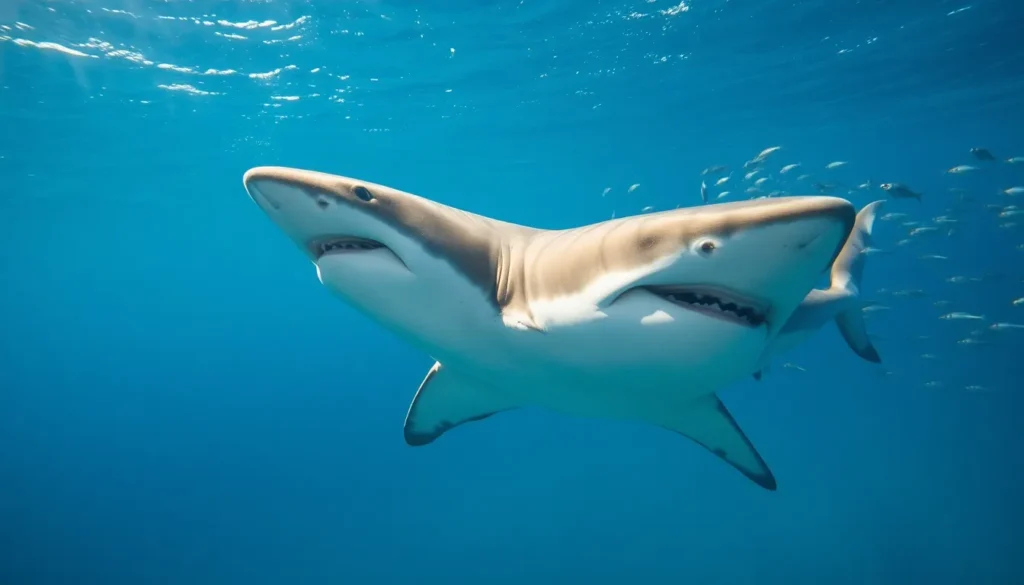When it comes to the ocean’s apex predators, sharks reign supreme in the sense department—especially when it comes to their ability to smell blood. But just how far can these finned detectives sniff out a tasty morsel? Spoiler alert: it’s further than you might think!
Imagine being at a beach party, enjoying a hot dog while a shark is lurking miles away, picking up the scent like a bloodhound on a mission. With their remarkable olfactory capabilities, sharks can detect blood from over a mile away, making them the ultimate underwater hunters. So, before you dive into the waves, you might want to reconsider that ketchup-covered snack! Dive into the depths of this fascinating topic and discover just how far sharks can smell blood—and why it’s both impressive and a little terrifying.
Table of Contents
ToggleUnderstanding Shark Senses
Sharks possess remarkable senses, with their sense of smell being particularly acute. This ability aids in locating prey from significant distances, enhancing their role as apex predators.
The Role of Olfactory Organs
Olfactory organs play a crucial role in a shark’s ability to detect scents in the water. These specialized organs, called olfactory bulbs, process scents and are highly efficient. Sharks can sense blood and other substances at concentrations as low as one part per million. This extraordinary capacity enables them to hunt effectively, even in murky waters. Their olfactory system is so advanced that it can detect odors from over a mile away, making them formidable hunters.
Comparison to Other Marine Animals
Many marine animals rely on scent for survival, but sharks stand out in comparison. While dolphins and fish also possess olfactory capabilities, their sense of smell does not match that of sharks. Research shows that sharks can detect odors from over 1,500 meters away, while other species may sense odors only within a few hundred meters. This significant difference showcases sharks’ evolutionary advantage in locating food and navigating their environment through scent.
How Far Away Can Sharks Smell Blood?

Sharks possess an extraordinary ability to detect blood, demonstrating an evolutionary advantage that enhances their predatory effectiveness.
Scientific Studies and Findings
Research shows sharks can smell blood from over 1,500 meters away. Studies indicate that their olfactory organs can identify scents in incredibly low concentrations, such as one part per million. In controlled experiments, scientists observed great white sharks responding to blood samples at significant distances. Their keen sense of smell allows them to locate potential prey even in murky waters. Sharks also showcase varying detection capabilities depending on the species, with some being more adept than others. Understanding these findings underscores sharks’ role as apex predators in their environment.
Factors Influencing Detection Distance
Several factors influence how far away sharks can smell blood. Water temperature plays a critical role, affecting scent dispersal. In warmer water, odors travel more quickly, enhancing detection distance. The presence of currents also impacts scent spread, with stronger currents dispersing blood rapidly. Additionally, turbidity levels, or water clarity, influence olfactory efficiency; clearer water allows for better scent transmission. Distance ability varies by shark species, depending on anatomical features and environmental adaptations. Overall, these elements combine to dictate how successfully sharks can locate food through scent.
Myths and Misconceptions
Many myths surround sharks’ ability to smell blood, leading to misconceptions about their sensory capabilities. Understanding these myths helps clarify the true nature of shark senses.
The 1-Mile Myth
Expecting sharks to detect blood from a full mile away is common but misleading. While some studies suggest detection ranges of over 1,500 meters, factors influence this distance. Water conditions like temperature and currents significantly affect scent dispersal. Consequently, the actual distance may vary, and mile-long claims oversimplify shark behavior.
Reality of Shark Sensory Capabilities
Sharks possess remarkable olfactory organs that allow them to detect blood in minuscule concentrations, sometimes as low as one part per million. Scientific findings indicate that while some species exhibit exceptional sensitivity, the effectiveness of their sense of smell often depends on several environmental factors. Research shows variations among species, with some detecting scents better than others. Understanding these differences provides a more accurate picture of sharks’ remarkable sensory abilities.
Conservation Implications
Sharks play a vital role in marine ecosystems. As apex predators, they help regulate fish populations, which maintains balance among species. Healthy shark populations contribute to the overall health of ocean environments. Some research indicates despite their importance, shark numbers face significant declines due to overfishing and habitat destruction.
Biodiversity benefits from sharks’ presence. Numerous studies show that the removal of sharks can lead to overpopulation of certain species. These populations can then disrupt coral reef ecosystems and compromise the stability of marine environments. Maintaining shark populations supports the resilience of these ecosystems.
Importance of Sharks in Ecosystems
Sharks serve essential functions in marine food webs. They prevent overgrazing by controlling prey species. Many reefs depend on the balance that sharks provide, ensuring various species thrive. Healthy populations contribute to comprehensive nutrient cycling, vital for ecosystem health. Studies reveal that when sharks are present, species richness increases, boosting biodiversity overall.
Understanding sharks promotes awareness of marine health challenges. Conservation efforts focus on protecting critical habitats, such as breeding grounds. Preservation of shark species directly influences the vitality of coral reefs and other ecosystems. Educating communities about the ecological roles of sharks fosters support for conservation measures.
Addressing Misunderstandings for Better Protection
Misconceptions about sharks hinder effective conservation efforts. Many individuals believe sharks exist solely as dangerous predators. This perception often leads to fear-driven actions that threaten their populations. Education can shift these narratives, emphasizing the ecological significance of sharks.
Promoting accurate information helps protect shark species. Highlighting their role in controlling fish populations fosters appreciation. Conservation campaigns encourage people to learn about sharks rather than fear them. Engaging storytelling and scientific insights combat myths surrounding shark aggression and support more effective protective measures. Community involvement in conservation has shown positive outcomes, proving that informed efforts matter.
Sharks’ ability to smell blood from remarkable distances underscores their role as crucial predators in marine ecosystems. Their keen sense of smell not only aids in hunting but also highlights the delicate balance within oceanic environments. Understanding these fascinating creatures helps dispel myths and fosters a greater appreciation for their ecological importance.
As awareness grows about the threats sharks face due to human activities, it becomes imperative to support conservation efforts. Protecting shark populations is vital for maintaining the health of marine ecosystems. By recognizing their vital contributions, communities can play a role in ensuring these magnificent animals continue to thrive in our oceans.






